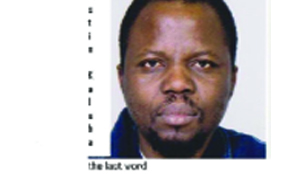 “Until the lion tells his side of the story, the tale of the hunt will always glorify the hunter.” African proverb
“Until the lion tells his side of the story, the tale of the hunt will always glorify the hunter.” African proverb
No information originating from one source can be universal and socially relevant to every society if it is not contextualised to suit the targeted groups.
Yet this is what the Western world has been doing for decades universalising Western information which has been peddled globally with Euro-centric arrogance.
This has been done in newspapers, books, curriculum and even ecclesiastical institutions like churches.
African history which is passed down orally has greatly been despised since it was not written down like that of our colonial masters.
Since our friends were empowered with the powers to write and ‘discover’ others early enough, they condescendingly started defining them using their societies as a yardstick.
The result has been gross misinformation and distortion by people who wrote our history usually missionaries who doubled as amateur anthropologists, district commissioners, self-styled historians and other pedestrian analysts.
Wherever colonialism took root, people who were formerly colonised are now fighting information and norms that were inculcated into their psyche to come up with knowledge that is more relevant to their societies.
In some black schools in America and South Africa, anti-racist educationalists and black community leaders are up in arms against a racist curriculum which does not meet the cultural needs of their students.
Many are now asking why dead white men and women should be the pillars of the 21st Century, without each society coming up with its own heroes and heroines.
In literature, educationists are asking why students are still being forced to read Homer, Virgil, Dante, Chaucer, Shakespeare, Milton and Dickens all who are very white and foreign.
When are students in non-European societies going to be adequately exposed to Maya Angelou, James Baldwin, Richard Wright, Chinua Achebe, Dominic Mulaisho, Kenneth Kaunda and Ezekiel Mphahlehle. Afro-centrists do have a valid point when they argue that championing a Euro-centric canon can help reinforce the prejudice that white is cerebral and black is physical.
Among ourselves as incurable victims of Westernisation, we despise folk knowledge in favour of academic knowledge that we learn in schools.
Academicians pride themselves in the knowledge they acquire and write books that are mere regurgitation of the white boy’s thinking.
As journalists, we have almost monopolised information by patronisingly flaunting opinions and views on many subjects.
Thus the coming of the internet complete with the social media like Face book or Twitter is welcome since it has given everybody a voice.
The social media is challenging the role of academicians and scribes throwing what have been termed as standard and ethics to the wind.
Now everyone can be heard as they express their opinions.
Isn’t that welcome? I strongly feel, information should not have canons, validations, affirmations or norms from any quarter no matter how revered the gatekeepers are. Everyone should have a right to tell their stories; blacks, women, children, illiterates, gentiles, prisoners, foreigners, tramps, everyone.
We should thank advances in technology that has broadened the playing ground for almost everyone who can express his opinion at the click of the fingers.
Previously, this was impossible since writing was at first a preserve of whites who discovered us.
Then the power was accorded to some educated Africans who tapped into the knowledge of whites and started writing books and stories in the newspapers.
Let’s not just look at the negative side of social media while ignoring the fact that much of Africa’s stories are being written on social media, in blogs, online magazines, etc.
Though I agree that social media is difficult to regulate since grain comes with chaff, I laud the positive aspect that has given ordinary people a voice. The most serious problem of having only a few writers like African writers, academicians and journalists telling our story is that we will continue with the perpetuation of the single story of despair and desolation that characterises such writing.
What we are as a people cannot be adequately be told by the group of writers I have cited above which has replaced the disdainful white writers who defined us earlier is now being narrated by everyone with an opinion.
With this bleak picture of the anointed few who have always told our stories changing, the Internet that has provided a platform for everyone who can scribble a sentence to comment on almost any subject is greatly welcome.
Traditionalists should acknowledge that the times are A’changing as Bob Dylan once sang.
It is a new brave cyber world in information advancement.
Scholars of African societies should find material for their studies on Africa on the Internet since there is cyber traffic of information being read on cellphone screens, Twitter, Face book, Watsapp, on blogs and on electronic magazines.
We might complain of the dying reading culture, but people are reading. Only that this time they are reading what is written by their peers with an advantage of immediate feedback.






